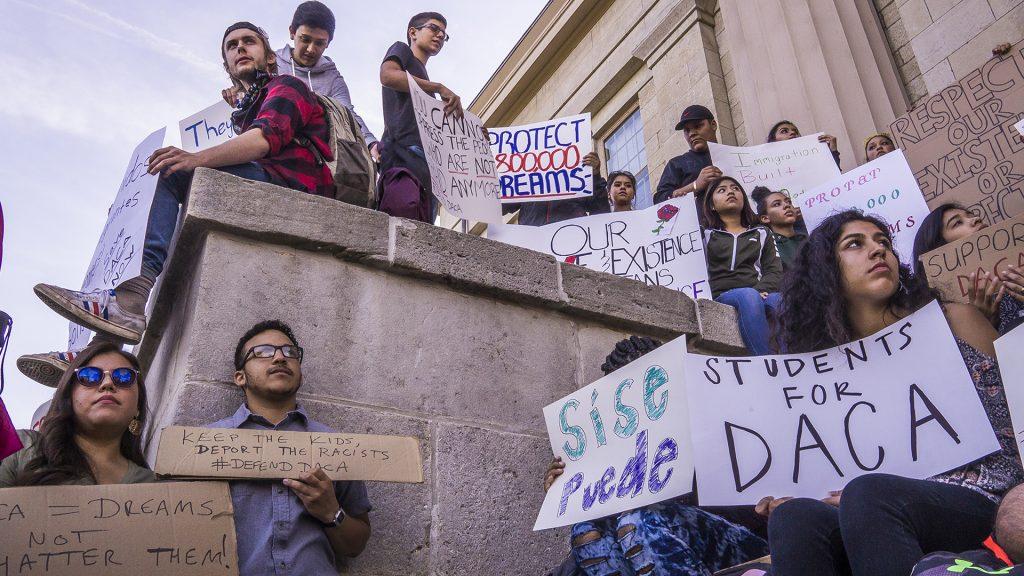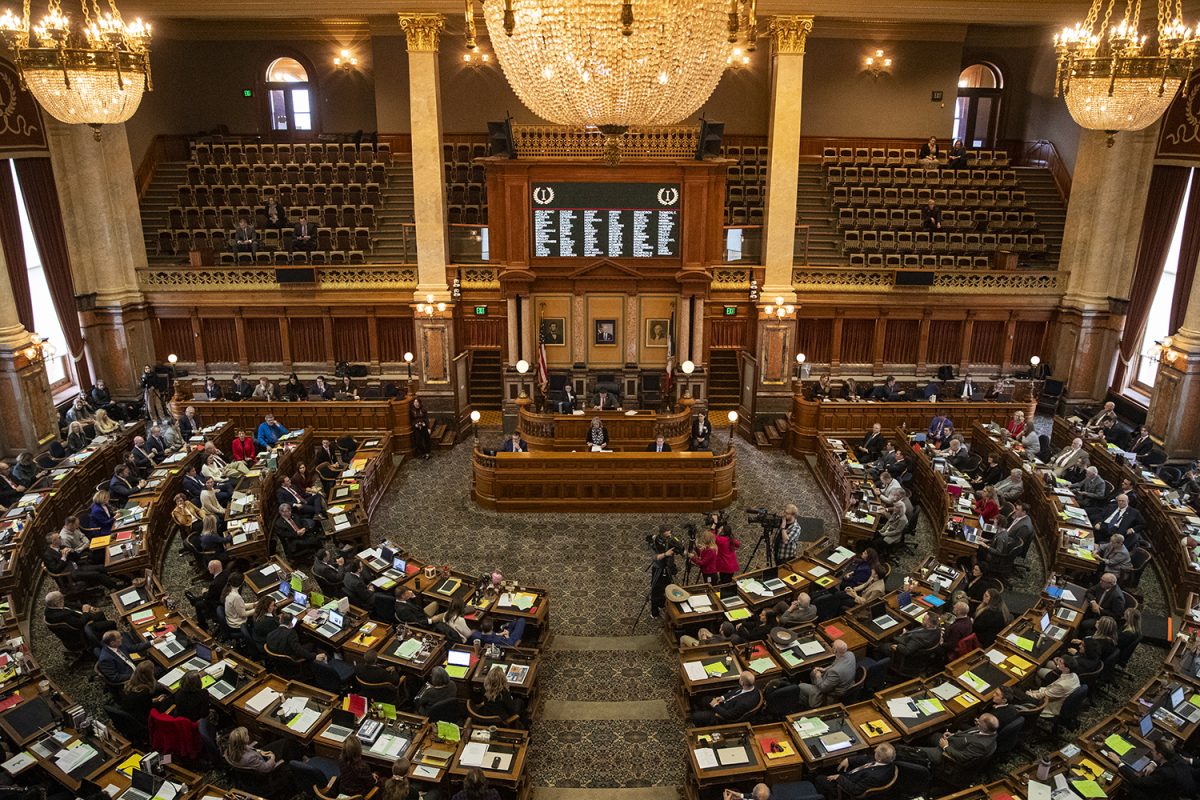President Donald Trump’s March 5 DACA deadline for Congress is inching closer. If Congress wants to save the program, it must pass by this date.
March 5 DACA deadline
Iowa City immigration attorney and University of Iowa alumnus Dan Vondra said he does not believe Congress will pass legislation before the deadline because of Trump’s demand that a fund be allocated toward a wall on the Mexico/U.S border in exchange for DACA.
“In my opinion that’s just a deal that the Democrats can’t make because the American public doesn’t want to spend billions of dollars on a wall,” Vondra said.
In a survey of U.S. residents over the age of 18 conducted in January by the Pew Research Center, 60 percent of respondents said they opposed substantially expanding a wall along the U.S. border with Mexico.
Iowa’s U.S. senators have appeared to be more optimistic; both Sen. Chuck Grassley, R-Iowa, and Sen. Joni Ernst, R-Iowa, have said in previous statements that they will work to pass legislation for DACA recipients before the deadline.
“Congress has been and must continue to work together to identify and pursue a measured approach that addresses DACA recipients’ unique situation and also respects the importance of our immigration laws, keeps our borders secure, and discourages future illegal immigration,” Ernst wrote in an email to The Daily Iowan.
Karla Alvarez, an academic coach in the UI Center for Diversity and Enrichment, said she supports the DACA program and hopes Congress finds a solution.
“I believe that these students are good citizens, and they’re important to the economy,” she said. “They are working, they are supporting their families, and they’re getting an education. This is the main reason that they are here, to better themselves.”
Government shutdowns
In January, the confict over DACA came to a head when U.S. Senate Democrats voted against a spending bill that failed to offer a solution for DACA. The failure of the bill to pass led to a three-day shutdown of the federal government. Many Republicans blamed Democrats for the shutdown, including Grassley and Ernst, who both released statements saying the shutdown was unnecessary.
Another shutdown of the federal government, which lasted just hours, occurred Feb. 9 after Congress failed to pass another spending bill because Sen. Rand Paul, R-Ky., blocked Senate business for several hours.
House Minority Leader Nancy Pelosi, D-Calif., urged House Democrats to vote against the bill because there was no DACA solution tied to it. Ultimately, 73 House Democrats voted for the bipartisan package and reopened the government.
What is DACA?
On Sept. 5, 2017, Trump rescinded the Deferred Action for Childhood Arrivals program, which was put in place through an executive order during the Obama administration in June 2012.
Under DACA, individuals who came to the U.S. as children and met certain requirements were able to request deferred removal action for two years. The action was renewable and also included eligibility for work authorization.
To apply for DACA, potential recipients must fill out numerous forms and collect proof that they meet the requirements. Once all the steps are completed, the U.S Citizenship & Immigration Services will decide if an individual will be granted DACA. If the agency denies the request, people cannot appeal or file a motion to reopen or reconsider that decision.
Who are the Dreamers?
A report from Citizenship & Immigration stated there were approximately 689,800 active DACA recipients nationwide as of Sept. 4, 2017. More than three-quarters of these recipients were born in Mexico.
The report also said Iowa was 36th in the nation in the number of DACA recipients with 2,500, or 0.4 percent of the total population of DACA recipients.
The average age of DACA recipients is 23.8 years old, with 36.7 percent of recipients falling into the 21 to 25-year-old category, according to the report.
Dreamers and higher education
There is a small community of DACA recipients at the University of Iowa, said the Diversity Center’s Alvarez. Because the UI does not inquire about students’ immigration status, there is no official number.
The university has resources for students who have received DACA or students who have a family member who has received DACA, including private donations to help students with the DACA process and safe spaces to discuss their family situation and learn about different resources.
RELATED: Undocumented UI students talks DACA
Alvarez said she believes it is important for DACA recipients to have access to higher education.
“Education is one of the ways that they can succeed in the job market, especially whenever they want to support their own communities or their families,” she said.
According to a November report from the Migration Policy Institute, an independent and nonpartisan group founded in 2001 to analyze the movement of people globally, 18 percent of DACA recipients are enrolled in college. The percentage of the total U.S population enrollment is 40.5 percent.
In an ongoing study called the National UnDACAmented Research Project, Harvard researcher Roberto G. Gonzalez has surveyed more than 2,000 self-identified DACA recipients about their education levels. He found that 22 percent have earned a bachelor’s degree.
Alvarez said a contributing factor could be the financial burden — DACA recipients are ineligible to receive federal financial aid. With the high cost of higher education, students who have received DACA may have to work full-time jobs as a student to pay for tuition.
Another issue facing students with connections to the DACA program is the stress caused by the uncertainty of the program. Alvarez said this, alongside financial concerns, has led to a negative effect on students’ mental health.
What is next for DACA
The DACA program will be suspended if Congress fails to pass legislation by the March 5 deadline.
Attorney Vondra, who has experience in helping people with DACA, said he believes clients with legal representation feel less nervous because they know the process, but they are still upset with the uncertain future of the program.
There are two groups of people who would be at the most risk if DACA were to end, he said, because they were eligible for DACA but would be in trouble under normal immigration law.
The people at the biggest risk if DACA were to end would be those who have old deportation orders, Vondra said.
“Generally in immigration law, if you have an old deportation order, it’s hard to get status,” he said.
Another group at risk would be those who have one possession-of-marijuana offense, which under immigration law would normally be a mandatory custody offense for those without a green card.
Unless there is an old removal order, the process for deportation for those in Iowa would begin with a notice to appear in imigration court in Omaha.
There are approximately 60 immigration courts in the U.S. and one court in the U.S. commonwealth of the Northern Mariana Islands.
Because of the small number of courts, Vondra said, immigration-court judges in Omaha are giving him court dates in 2021 and 2022. He noted an influx of cases would make the process even longer because of the backlog of cases growing exponentially.
If DACA were to end, he said, there are other options for recipients. People under the age of 21 could be eligible for Special Immigrant Juvenile Status, which provides certain children the ability to seek lawful permanent residence in the United States.
Options for those over the age of 21 include applying for family-based petition, cancellation of removal, or asylum.
“A lot of [DACA recipients] probably have a fair number of options; they’re just not the best options,” Vondra said.









